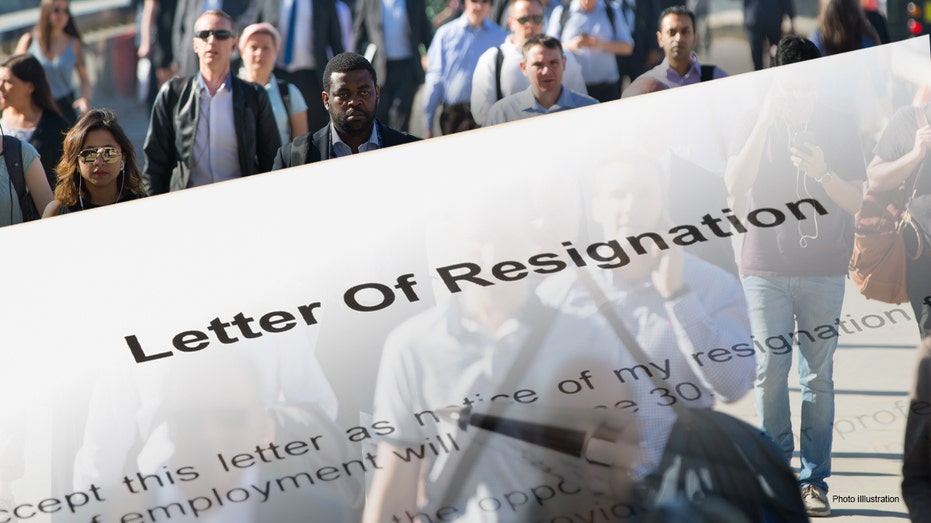Career challenge: Do you really need to give 2 weeks' notice when leaving a job?
How much notice is acceptable? Career experts share the best job tips for all workers
If recession gets worse, jobs will be impacted negatively: Investment expert
Mainstay Capital Management founder and CEO David Kudla discusses his expectations for the July employment report and weighs in on markets on 'Mornings with Maria.'
If you are job hunting and you get the dream-job offer you’ve been waiting for, you may want to quit your current job ASAP and get going in the new place.
But, before you stroll into your manager's office to give your notice or send a hasty "see ya later" email, job experts suggest you pause — and put a plan in place to quit.
It’s customary to give two weeks’ notice to your boss when you quit.
So should you?
CAREER CHALLENGE: HOW TO USE YOUR LUNCH BREAK TO BOOST PRODUCTIVITY FOR THE REST OF THE DAY
Job experts weigh in on this question and share the finer points connected to this convention.
Your motivation should be courtesy to your current workplace and manager
Quitting with little or no advance notice to your current position can burn bridges in the corporate world.

A businessman gives a resignation letter to his employer. Providing at least two weeks' notice, explain career experts, allows workers "to maintain a strong relationship with their employer." (iStock / iStock)
The world can be a small place — especially in niche industries.
"Employees are in an ‘at will’ relationship with their employers, meaning they can be fired at any time (for the right reasons), but they can also leave whenever they choose," explained John Feldmann, senior communications specialist at Insperity, based in Houston, Texas.
Your role in your company’s structure and flow should be considered when deciding whether or not to give a two-week notice.
"Employers shouldn’t expect to receive two weeks’ notice; however, providing it allows employees to maintain a strong relationship with their employer, which can be advantageous should they need a future reference or client referral."
The two-week notice topic is very relevant, said Feldmann, when the "job hopping" trend has become increasingly acceptable.

The courtesy of two weeks' notice when leaving a job is always greatly appreciated by employers, career experts share. (iStock / iStock)
"Two weeks’ notice isn’t necessary, but rather it's a courtesy," he added.
Consider how your departure will affect the team
Your role in your company’s structure and flow should be considered when deciding whether or not to give a two-week notice to your current employer.
"The courtesy of giving two weeks’ notice not only gives your leaders enough time to get up to speed on your current work projects, it also allows time for your company to reorganize the workflow, reassign your tasks, ask for help or input with backfilling your role, and possibly consider restructuring the department for efficiency," explained Sara Skirboll, vice president of communications for CareerBuilder.
PERFECTIONIST BOSS, IMPERFECT WORKER — CAN THIS WORKING RELATIONSHIP BE SAVED?
She is based in Austin, Texas.
With your departure comes the need to reshuffle responsibilities or interview for a new hire.
Consider how your level of responsibility impacts the two-week benchmark for notice
For some senior-level roles, providing more than two weeks’ notice is recommended, said Feldmann.
That's because the elevated responsibilities associated with these roles have a greater impact on company success than those of lower-level positions.

"Providing advance notice" that you'll be leaving for another job "allows for a smooth transition of projects and assignments," said one career expert.
"It’s also important for employees to consider the colleagues who will inherit their workload after they leave," he added.
"Many coworkers develop strong friendships," he also said.
"Providing advance notice allows for a smooth transition of projects and assignments, enabling employees to assist with their colleagues’ training prior to departure."
Is there any scenario when two weeks’ notice isn’t necessary?
Feldmann suggested there are a few exceptions when it’s best not to provide any advance notice before leaving.

Even if you've worked for an employer for a few months, it's best to think about providing two weeks' notice to retain a good working relationship. (iStock / iStock)
"These include situations when remaining on the job would be detrimental to the employee’s safety and well-being, or if he or she is asked to do something illegal or unethical," Feldmann said.
And, if you've only worked for a short time in your current role, in some circumstances it can be appropriate to provide less notice, as even short notice will assist with a smooth transition.
"You demonstrate respect by giving them time to plan the workflow."
"By providing your bosses with a sufficient amount of notice in your resignation letter, you demonstrate respect by giving them time to plan the workflow, assign duties and get ready to find a suitable replacement before your departure," said Lauren Hart, executive recruiter at MRL Consulting Group in Austin, Texas.
AMID INFLATION, PEOPLE DESPERATE FOR CASH ARE TURNING TO PAWN SHOPS
"If you've worked for your company for more than a month but less than two years, it's polite to give your employer at least one week's notice."
CLICK HERE TO READ MORE ON FOX BUSINESS
But, she said, even if you've just been employed by your employer for a few months, it's best to think about providing two weeks' notice in order to retain a good working relationship.




















